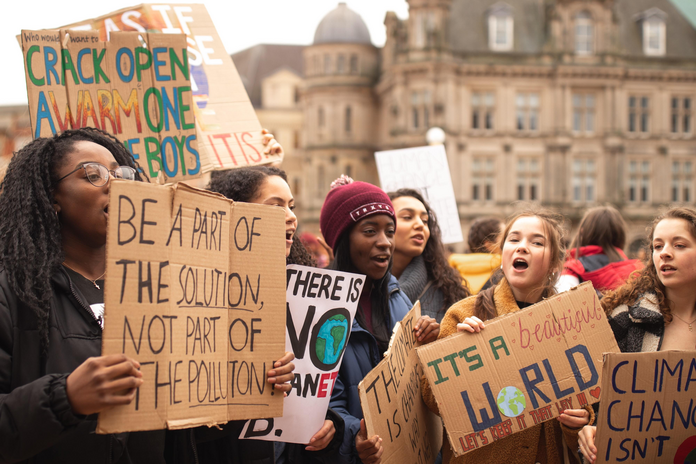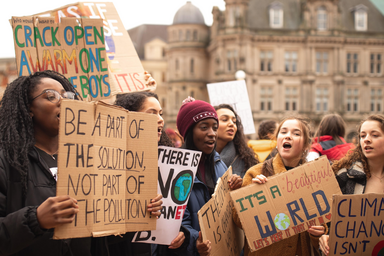With the latest Intergovernmental Panel on Climate Change report published in August and Hurricane Irma recently devastating Louisiana, climate change has been top of mind for many people. Although climate change didn’t directly cause Irma and the countless other dangerous extreme weather events we’ve seen in recent years, it is intensifying them.
As we see climate change continue to cause increased temperatures, rising sea levels and warmer oceans, among other consequences, these extreme weather events will become the norm—if they haven’t already.
That being said, it’s important we consider who is being severely impacted, and who can help us solve this climate crisis. The short answer to both of these questions is women. Of course, women are not the only demographic seriously impacted by climate change, but they have been and continue to be disproportionately affected by the dangers it poses.
How women are impacted by climate change
Women’s increased vulnerability to climate change comes from a variety of economic, social and cultural factors. First off, the majority of the world’s poor are women, who are also often more dependent on threatened natural resources, such as water. According to the United Nations (U.N.), of the 1.3 billion people living in poverty, 70% are women. More specifically, women worldwide aged 25-34 are 25% more likely than men to live in extreme poverty.
The U.N. also reports that globally, in comparison to men, women have less access to land, credit, environmental goods and services, decision-making structures, technology, training or education and other important tools that can help one adapt to and help combat climate change.
Particularly in rural areas and impoverished communities dependent on local natural resources, women often bear the responsibility of getting water and energy resources for cooking, heating, and food security. Extreme weather events, such as droughts and floods, often require women to work even more to secure the livelihood of their households. This leaves less time for education, developing skills, and earning income.
During and after Hurricane Katrina in 2005, African American women were among the worst affected by flooding in Louisiana, where low-lying cities like New Orleans are increasingly at risk.
When disasters hit, some cultural norms and childcare responsibilities prevent women from migrating or seeking refuge. As a result, they may face many heightened challenges, including being in danger of injury or death or having to travel farther for safe drinking water and other vital resources.
Others are simply forced out. Reports show that 80% of people displaced by climate change are women. This displacement may prevent girls and women from getting or continuing education. Refugees also face displacement camps that often lack basic resources.
Health concerns are another big issue. For instance, because women may have to travel to get safe water and fuel sources, heat waves cause problems like dehydration and heatstroke. Additionally, ocean acidification and rising water temperatures are causing fish populations to decline. So, women whose lives, or whose family’s lives, depend on fish are now selling sex for food. And women are usually more susceptible to the harmful effects of coal-fired power plants. Reports show that one in six women of childbearing age now has unsafe levels of mercury in their blood.
Further, it’s known that women face heightened violence and exploitation during conflict and instability, often to reinforce gender imbalances and maintain control of limited resources. The U.N. reports higher rates of domestic violence, sexual violence, human trafficking and even child marriage due to climate change.
Because of all of this, the 2015 Paris Climate Agreement actually includes specific provisions to support women’s empowerment to combat these effects.
How women are becoming climate action leaders
Despite everything mentioned above and much more, women aren’t just helpless victims. They are also our best advocates for combatting one of the most complex challenges of our time. It’s reported that women make better leaders and organizers, especially during a crisis.
Historically, women have built a strong body of knowledge that can be used to combat climate change and disasters, such as expertise in water harvesting, food preservation, natural resource management, healing and caretaking. For instance, Indigenous women hold unique traditional ecological knowledge and a spiritual and philosophical approach to healing the Earth due to their close relationship with the land.
Globally, women are showing remarkable resilience. When women are uplifted, they create extraordinary solutions that have transformative effects on their communities, countries, and worldwide. For instance, New Zealand’s Prime Minister Jacinda Ardern promised its public sector would become carbon neutral by 2025. Well-known climate activists Greta Thunberg and Vanessa Nakate spurred a global environmental movement. World leader Christiana Figueres spearheaded the Paris Climate Agreement.
The women-led initiative Solar Sister has helped 1.8 million people across Africa with solar energy and clean cookstoves. A group of women created Sudan’s first-ever Women’s Farmers Union to improve food security. After Hurricane Maria hit Puerto Rico, architect Carla Gautier and her friend Maria Gabriela Velasco formed HiveCube to rebuild thousands of homes by repurposing shipping containers.
While women are gaining more representation in decision-making bodies and opportunities for learning and leadership, countries are starting to develop gender action plans for climate action.
Key takeaway: Women are visionaries
Continuing to acknowledge the benefits women bring to the table can help reduce inequality and accelerate action to solve the climate crisis. It’s vital we allow and encourage women to be members of the decision-making process at local, national, and even international levels to develop gender-sensitive responses to the impacts of climate change.


